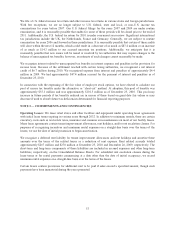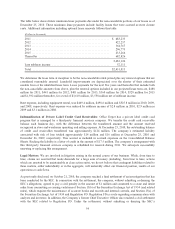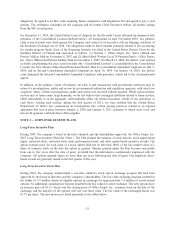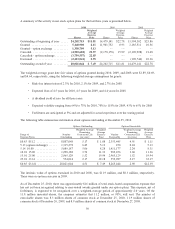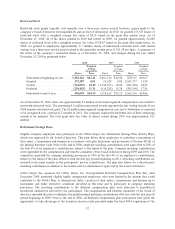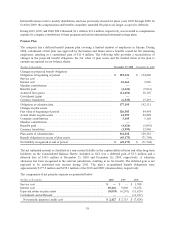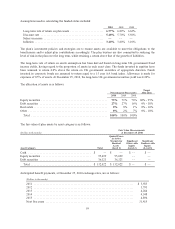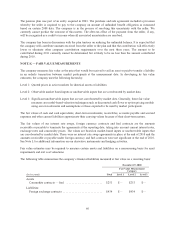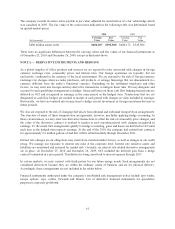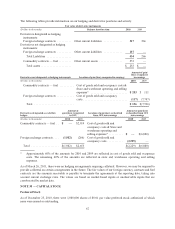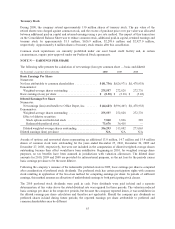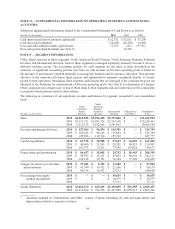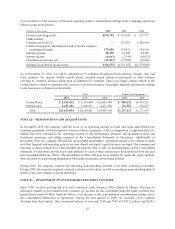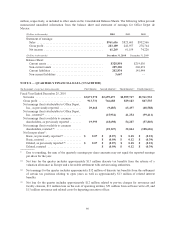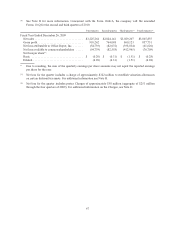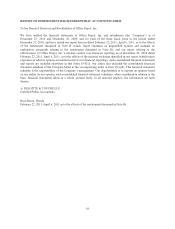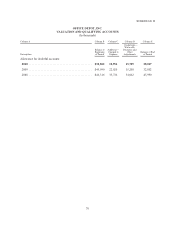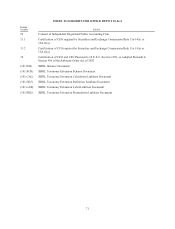Office Depot 2010 Annual Report Download - page 64
Download and view the complete annual report
Please find page 64 of the 2010 Office Depot annual report below. You can navigate through the pages in the report by either clicking on the pages listed below, or by using the keyword search tool below to find specific information within the annual report.
Treasury Stock
During 2008, the company retired approximately 150 million shares of treasury stock. The par value of the
retired shares was charged against common stock, and the excess of purchase price over par value was allocated
between additional paid-in capital and retained earnings using a pro rata method. The impact of this transaction
on the Consolidated Balance Sheet was to reduce common stock, additional paid-in capital, retained earnings and
treasury stock by approximately $1.5 million, $626.9 million, $2,298.6 million and $2,927.0 million,
respectively. Approximately 6 million shares of treasury stock remain after this cancellation.
Common stock repurchases are currently prohibited under our asset based credit facility and, in certain
circumstances, require prior approval under our Preferred Stock agreements.
NOTE N — EARNINGS PER SHARE
The following table presents the calculation of net earnings (loss) per common share — basic and diluted:
(In thousands, except per share amounts) 2010 2009 2008
Basic Earnings Per Share
Numerator:
Net loss attributable to common shareholders ............... $ (81,736) $(626,971) $(1,478,938)
Denominator:
Weighted-average shares outstanding ................... 275,557 272,828 272,776
Basic earnings (loss) per share ........................... $ (0.30) $ (2.30) $ (5.42)
Diluted Earnings Per Share
Numerator:
Net earnings (loss) attributable to Office Depot, Inc. ....... $ (44,623) $(596,465) $(1,478,938)
Denominator:
Weighted-average shares outstanding ................... 275,557 272,828 272,776
Effect of dilutive securities:
Stock options and restricted stock .................... 7,060 3,836 289
Redeemable preferred stock ......................... 73,676 36,418 —
Diluted weighted-average shares outstanding ............. 356,293 313,082 273,065
Diluted earnings (loss) per share ......................... N/A N/A N/A
Awards of options and nonvested shares representing an additional 13.0 million, 14.7 million and 15.4 million
shares of common stock were outstanding for the years ended December 25, 2010, December 26, 2009 and
December 27, 2008, respectively, but were not included in the computation of diluted weighted-average shares
outstanding because their effect would have been antidilutive. Beginning in 2010, for weighted average share
purposes, no tax benefits have been assumed in jurisdictions with valuation allowances. The diluted share
amounts for 2010, 2009 and 2008 are provided for informational purposes, as the net loss for the periods causes
basic earnings per share to be the most dilutive.
Following the company’s issuance of the redeemable preferred stock in 2009, basic earnings per share is computed
after consideration of preferred stock dividends. The preferred stock has certain participation rights with common
stock resulting in application of the two-class method for computing earnings per share. In periods of sufficient
earnings, this method assumes an allocation of undistributed earnings to both participating stock classes.
The 2010 preferred stock dividends were paid in cash. Prior dividends were paid in-kind and a separate
determination of fair value above the stated dividend rate was required for those periods. The valuation reduced
basic earnings per share in the respective periods, but because the company reported losses, it was antidilutive in
the diluted earnings per share calculation and therefore not applicable. Should the company pay dividends on
preferred shares in-kind during future periods, the reported earnings per share attributable to preferred and
common shareholders may be different.
63


